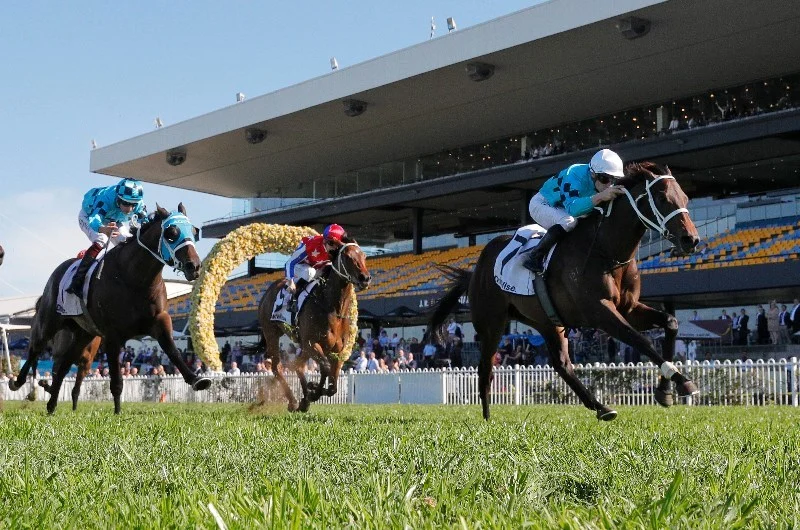Understanding the Key Factors That Influence Betting Odds in Horse Racing
November 15, 2024
 IMAGE: Bradley Photos
IMAGE: Bradley Photos
Horse racing is not just a sport; it’s an exhilarating world of strategy and chance. Betting odds play a crucial role in this universe, guiding bettors on potential outcomes. Understanding these odds can lead to more informed and successful betting decisions. So, what exactly influences these odds?
Key Takeaways
- Betting odds indicate the likelihood of a horse winning and potential payouts.
- Factors like form, track conditions, and market demand significantly influence odds.
- The pari-mutuel betting system dynamically adjusts odds based on real-time betting activity.
Understanding What Influences Betting Odds in Horse Racing
Betting odds are more than just numbers; they are a reflection of a horse’s chances of winning a race. They inform bettors how much they can win if their chosen horse triumphs. For instance, a horse with odds of 2/1 is considered more likely to win than one with odds of 100/1. Understanding what affects these odds can provide valuable insights for those looking to make informed bets.
Factors Influencing Horse Racing Betting Odds
Form and Performance
A horse’s recent race results and finishing positions significantly impact its odds. Consistent wins and strong performances usually result in lower odds, indicating a higher chance of success. Bettors often study form guides, which summarize a horse’s recent performances, to gauge its current form and reliability.
Class and Competition
The level of competition, or class, in which a horse races can greatly affect its odds. Higher-class races with top-quality horses often result in more competitive odds. Horses moving to a higher class may face longer odds, while those dropping to a lower class might see shorter odds.
Track Conditions
The type of track surface—be it turf, dirt, or synthetic—and its condition (firm, wet, muddy) can influence a horse’s performance. Horses with proven success on specific track conditions often receive more favorable odds. Understanding how a horse performs on different surfaces can give bettors an edge.
Trainer and Jockey
The reputation and success rate of a horse’s trainer and jockey can sway betting odds. Trainers known for their expertise or jockeys with a winning record often lead to shorter odds for their horses. Analyzing trainer and jockey statistics can provide valuable insights for bettors.
Weight Carried
Weight carried by a horse, determined by handicapping rules, aims to level the playing field. Heavier weights can negatively impact a horse’s chances, leading to higher odds. Understanding how weight affects performance is crucial for making informed bets.
Market Demand and Betting Volume
The amount of money wagered on a particular horse, or market demand, directly affects odds. High demand shortens odds, while low demand lengthens them. Bettors’ preferences and betting patterns play a significant role in shaping odds.
For bettors interested in Monmouth park picks today, tracking market demand can reveal valuable insights. High betting volumes on certain horses at Monmouth Park often lead to shorter odds, reflecting strong support among bettors. Recognizing these trends can provide a strategic edge, helping bettors make more informed choices.
The Role of Pari-Mutuel Betting in Determining Odds
Pari-mutuel betting is a system where all wagers are pooled, and payouts are based on the total pool after deducting fees and taxes. This system allows for dynamic odds that adjust in real-time based on betting activity. As more bets are placed on a specific horse, its odds decrease, reflecting its popularity among bettors. This method leverages the “wisdom of the crowd,” creating more accurate odds than fixed-odds systems.
Additional Factors Affecting Betting Odds
Late Money and Scratchings
Bets placed close to race time, known as late money, can significantly shift odds. If a horse is scratched from a race, odds are recalculated for the remaining horses, impacting potential payouts.
Distance and Course Suitability
A horse’s past performance at specific distances and tracks can affect its odds. Horses that have excelled at similar distances or courses often receive more favorable odds.
Workouts and Preparation
Training routines and workout reports provide insights into a horse’s fitness and readiness. Positive workouts can influence odds, though other factors like form and competition usually carry more weight.
Public Perception and Class Upgrades/Downgrades
Public perception, or the collective opinion of bettors, shapes odds. Strong public support for a horse often shortens its odds. Similarly, changes in class—either upgrades or downgrades—can affect a horse’s odds, reflecting its readiness for the competition level.
Conclusion
Understanding the myriad factors that influence betting odds in horse racing is key to making informed bets. From form and track conditions to market demand and pari-mutuel betting, each element plays a vital role. Stay informed and analyze these factors to enhance your betting strategy.
February 28, 2026
NRL: Bulldogs Vs Dragons - Match Insights & Our Tips
The Bulldogs will be eager to turn fast starts into finals success after last year’s straight-sets exit, while the Dragons are desperate to climb back into contention following another Read MoreFebruary 28, 2026
NRL: Knights Vs Cowboys - Match Insights & Our Tips
The NRL heads to Las Vegas and the Knights will usher in a new era under Justin Holbrook as they look to atone for last year’s heavy loss to North Queensland With Kalyn Ponga fit and Dylan Brown Read MoreFebruary 28, 2026


Tell Us What You Think Below